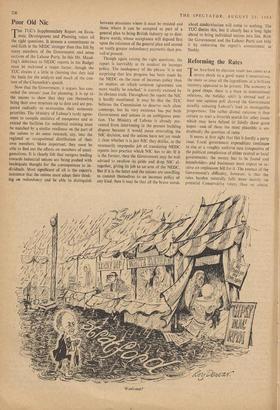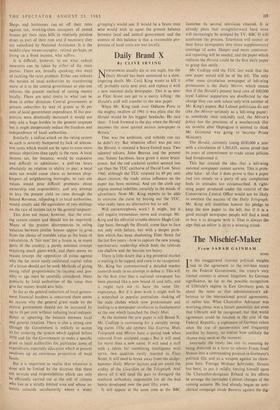Reforming the Rates
THE Stra'ford by-election result has come as a severe shock to a good many Conservatives, the morr so since all the ingredients of a brilliant recovery appeared to be present. The economy is in good shape, there is a thaw in international relations, the holiday spirit is abroad and at least one opinion poll showed the Government steadily reducing Labour's lead to manageable proportions. The rather dismal outcome is thus certain to start a feverish search for other issues which may have helped to falsify these great hopes—and or these the most plausible is un- doubtedly the question of rates.
It seems at first sight that this is hardly a party issue. Local government expenditUre continues to rise at a roughly uniform rate irrespective of the political complexion of either central or local governments; the money has to be found and householders and businesses must expect to re- ceive an unpleasant bill for it. The essence of the Government's difficulty, however, is that the rates burden naturally falls more heavily on potential Conservative voters than on others. Shops and businesses can set off their rates ,against tax, working-class occupiers of rented houses get their rates bills in relatively painless doses as part of their rent and if necessary they are subsidised by National Assistance. It is the middle-class owner-occupier, retired perhaps, or living on a fixed income, who suffers.
It is difficult, however, to see what radical measures can be taken by either of the main parties. There are, broadly speaking, two ways of tackling the rates problem. Either one reduces the burden of local authorities by transferring more of it to the central government or else one reforms the present method of raising money locally. There are strict limits to what can be done in either direction. Central government at present subscribes by way of grants to 56 per cent of local government expenditure. If this pro- portion were drastically increased it would not only add a huge burden to the general taxpayer but it might dangerously reduce the freedom and independence of local authorities.
Similarly, a radical attack on the rating system as such is severely hampered by lack of alterna- tive taxes which would not be open to even more serious objections than apply to the rates. A local income tax, for instance, would be expensive and difficult to administer; a poll-tax bears absolutely no relation to ability to pay; a local sales tax would cause chaos as between shop- keepers of neighbouring boroughs; to rate site values would pose difficult 'problems about ownership and responsibility; and any attempt to levy the present yield on rates through the Inland Revenue, refunding it to local authorities, would simply add the equivalent of two shillings on the rate of income tax to the general taxpayer.
This does not mean; however, that the exist- ing system cannot and should not be improved. Many of the present discrepancies in rating valution between similar houses appear to arise. from the choice of rentable value as the basis of calculation. A 'fair rent' for a house is, in many parts Of the country, a purely notional concept requiring much guess-work, and there seems no reason (except the opposition of estate agents) why the far more easily caldulated capital value of a house should not be used. Methods of giving rating relief proportionate to income and pos- sibly to age must be carefully considered. More publicity by local authorities of the value they give for money would also help.
So far as the general reduction of local govern- ment financial burdens is concerned there seems no reason why the general grant made by the central government should not be increased by up to 10 per cent without reducing local indepen- dence or upsetting the balance between local and general taxation. There is also a strong case (though the Government is unlikely to accept it) for restoring the system which applied before 1958 and for the Government to make a specific grant to local authorities for particular items of expenditure, especially education which at present swallows up an enormous proportion of local funds.
But it is important to realise that whate'ver is done will be limited by the doctrine that there are services and responsibilities which can only be efficiently carried out at the will of citizens who live in a strictly limited area and whose in- terests coincide satisfactorily where' a wider grouping's would not. It would be a brave man who would wish to upset the present balance between local and central government and the essence of this balance is that a reasonable pro- portion of local costs are met locally.































 Previous page
Previous page